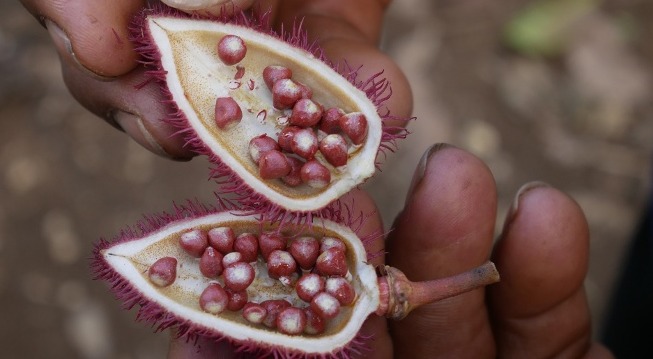Bio-entrepreneurship in the Amazon
 The Bioeconomy Program of Fundación Pachamama—our sister organization in Ecuador—aims to support and promote the creation of bio-entrepreneurship, innovation ecosystems, and regeneration projects in the Amazon region. These innovative alternative projects search for solutions based on sustainable use of forest resources that are also financially viable for community development.
The Bioeconomy Program of Fundación Pachamama—our sister organization in Ecuador—aims to support and promote the creation of bio-entrepreneurship, innovation ecosystems, and regeneration projects in the Amazon region. These innovative alternative projects search for solutions based on sustainable use of forest resources that are also financially viable for community development.
Cosmetics from the Rainforest
Currently, Fundación Pachamama is guiding several innovative projects in different provinces of the Amazon involving multiple communities. In the Shuar communities of Tuutinetza and Pampants in the province of Morona Santiago, there are two projects underway for the installation of an artisanal soap factory and then the production of high quality local cosmetics. The soaps are made with bio-products from traditional Shuar crops such as turmeric, ginger, cinnamon, nuts, morete and sekumur (traditional Shuar soap). In the neighboring community of Pampants, an essential oil factory will soon be installed, which will create products that can be sold in the national and international markets and made available to the local inter-community economy.
To carry out this program, Fundación Pachamama relies on strong strategic alliances through cooperation agreements with international and local organizations such as Decentralized Autonomous Governments (provincial, cantonal and parochial); Universities; and producer associations in the region who have sufficient experience and whose products are already on the national and international market.
Ecotourism and Traditional Farming
The Fundación Pachamama team traveled to the far end of the Pastaza Province in southeast Ecuador to continue its field work on bio-economy projects in the Achuar territory. COVID-19 severely impacted this area, affecting local livelihoods and especially the community ecotourism facilities of Kapawi, Tiinkias, and Sharamentsa. Working together with the communities, a range of bio-economy projects is being investigated to strengthen community resilience and improve the livelihoods of these Indigenous communities, and of women in particular.
Currently, the focus is on strengthening the traditional farming system in the lower basin of the Pastaza river, to create sources of additional income, guarantee food security, and preserve traditional plant knowledge. The work will be initially carried out in 6 communities, and will include 6 more in a second phase. To start, we’re working with 3 pilot communities: Kapawi, Suwa, Kusutkau.
Vanilla
The local school in Kapawi, Colegio Tuna, will be focused on promoting the preservation of traditional plant knowledge, and more specifically, with the production of vanilla. A large patch of wild vanilla (vanilla pompona spp.) was discovered in the wetland area near the school. This offers the ideal opportunity to learn about cultivation, pollination, and other key aspects of the plant that could enable a future community enterprise that benefits the local school and the surrounding communities. The students themselves will carry out and thus learn from the project. In these first training sessions, students learned to identify different types of vanilla, how to pollinate the vanilla blossom by hand on the precise day, how to produce new cuttings to produce new plants, and how to properly plant them in soil and nutrient beds.
Fish Farming
There are different factors behind the decrease in fish stocks in the Amazon rivers, and unfortunately this is the case in the lower Pastaza river basin as well. Fish farming was introduced in the region years ago, and it is part of the daily family activities in the Achuar community of Suwa. People there have been experimenting and building pisciculture pools for a number of years. Therefore, Suwa will lead the communities in fish farming with native species. The project will support the training of a local technician, who will bring the knowledge back to the communities to support the implementation of fish farms in the region. As part of the project, visitors of Kapawi Ecolodge will have the chance to visit the fish farm project at Suwa, catch their own fish, and cook and eat it while sharing time with the people of the Suwa community.
Pepper Powder
Hot pepper powder (Acham in Achuar) is a cooking tradition among Achuar women, especially among the women of the community of Kusutkau. This is why Kusutkau will focus its efforts in the production of Acham. Local women producers will lead the development of a community enterprise to sell processed Acham to national and international markets with the support of other implementing partners. Women received the equipment and supplies needed in order to produce this safely, including gloves, eye-protective gear and hand-mills. In this particular workshop, the trainers were two women of the community. The objective is to expand this initiative to other communities, integrate it into the traveler experience at Kapawi Ecolodge in its menu, and sell this delicacy under a common brand.
Medicinal Plants
Working with local families and leaders to preserve ancient medicinal knowledge and practices (use of natural medicinal plants) helps with improving the process of farm production and provides an opportunity for income generation for local people. This past year the most important medicine produced in the communities has been an Amazonian drink, that includes up to 12 species of native plants found in the forest, and has aided in treatment for and minimizing the impact of COVID-19.
Supporting these projects creates an approach consistent with circular economy and bio-economy principles: Giving value to nature, biodiversity, and community knowledge, creating economic incentives for conservation and cultural preservation, and creating long-term revenue streams for local communities under fair trade systems.
All of the project’s activities promote Indigenous principles of regenerative agriculture, increasing biodiversity, enriching soils (capturing carbon dioxide), improving watershed management, and enhancing and promoting the value of ecosystem services.